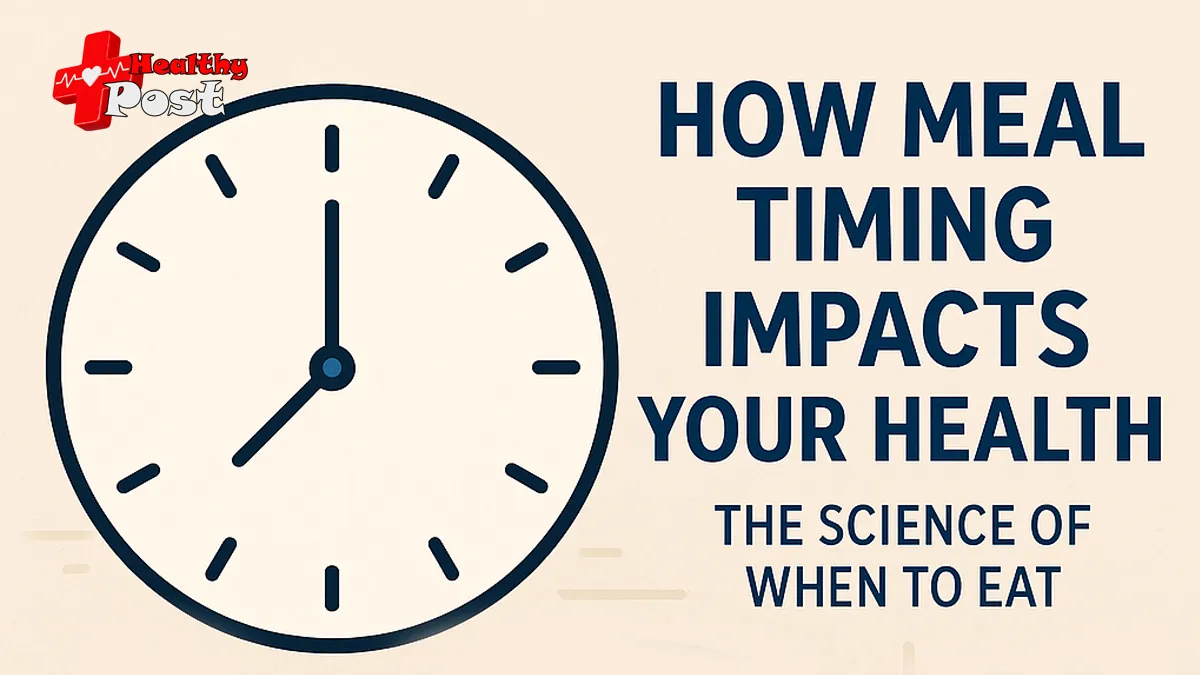
How meal timing affects our health
Eating right means eating healthy foods and, just as importantly, at the right time “Timing is everything,” says Jeannette Hyde, a nutritionist and author of The 10-Hour Diet. Eating at specific times can help you lose weight, reduce your risk of chronic disease, and improve your sleep. The key is to sync your breakfast, lunch, and dinner with your circadian rhythms. In this article you will know everything about Meal Timing.
The liver, pancreas, and fat cells have their own “working hours,”. Which are also call peripheral circadian rhythms. They are weakly dependent on daylight hours, but are sensitive to diet.
By the way, the topic of circadian rhythms in nutrition is so important that a new direction has even emerged in nutrition science – chrononutrition . Its goal is to study how the time of food intake or the absence of, for example, regular breakfast can affect health.
By the way, the topic of circadian rhythms in nutrition is so important that a new direction has even emerged in nutrition science – chrononutrition . Its goal is to study how the time of food intake or the absence of, for example, regular breakfast can affect health.
Meal timing: best time to have breakfast?
In English, breakfast is breakfast, which literally means “to break your fast.” The sooner you eat breakfast after waking up, the better for your metabolism, says Kim Larsen, a Seattle-based nutritionist and nutritionist. It’s best to eat your first meal within two hours of waking up.
If you exercise in the morning, you can eat something light before your workout, such as a banana or avocado toast. However, if you feel that your body is able to work better on an empty stomach, you can have breakfast after your workout.
The dangers of skipping breakfast
Experts from the Harvard School of Public Health do not recommend skipping breakfast. They studied data from 26,902 men aged 45 to 82 for 16 years and found that those who regularly skipped breakfast had a 27% increased risk of a heart attack. The study’s authors also note that those who skip breakfast risk overeating at dinner, which is extremely harmful to metabolism. Possible problems include excess weight, a high risk of type 2 diabetes, and arterial hypertension.

A large-scale study by Korean scientists involving more than 14 thousand men and women confirmed that if 25% of daily caloric intake is consumed at breakfast, the risk of metabolic syndrome is reduced – this is the name given to a complex of disorders in which there is excess fat in the abdominal cavity, high blood pressure, high blood sugar levels, decreased tissue sensitivity to the hormone insulin, and impaired cholesterol metabolism .
Meal timing: What to eat for breakfast
Julia Zumpano, a clinical nutritionist at the Cleveland Clinic (USA), recommends eating a protein breakfast: egg whites with turkey or chicken sausages and cottage cheese or Greek yogurt. For vegetarians, a tofu omelet is suitable.
Meal timing: What time to plan lunch
The optimal time for lunch is from 12:00 to 15:00. If you have lunch during this time period, it is easier to maintain a healthy weight or lose extra pounds. In countries where lunch is the heaviest meal, for example in France, people suffer less from obesity and cardiovascular diseases.
What happens if you have lunch later?
It is highly desirable to get into the activation window of adiponectin , a hormone secreted by fat cells. The level of adiponectin in the body increases until midday, reaching a maximum around 12:00–14:00, and then gradually decreases. The hormone increases the sensitivity of cells to insulin, and glucose is absorbed better. Adiponectin also stimulates fat burning.
What’s for lunch
By 2–3 p.m., energy levels begin to drop, so eating lunch at this time will add strength, but only if you choose the right foods. It is advisable to eat dishes rich in protein and fiber, and it is better to avoid sweet and very fatty foods, otherwise you will feel sluggish after eating.
When is the best time to have dinner?
Nutritionist Lisa Young, an associate professor of nutrition at New York University, says the earlier you eat dinner and the lower the calories, the better. Dietitian Julia Zumpano explains:
It is optimal to plan dinner for 18:00–19:00, but only if you are an “early bird,” meaning you go to bed around 22:00. “Night owls,” who are most active after 16:00, can have dinner before 22:00 because their biological clocks only get ready for sleep at 1 a.m.
What happens if you have a late dinner?
Firstly, the later you have dinner, the harder it is to feel full , because after 7:00 pm the level of the hormone leptin , which suppresses hunger, promotes the breakdown of fats and prevents their accumulation, gradually falls. Therefore, it will be harder to feel full, and there is a risk of overeating.
Secondly, those who eat dinner late burn calories more slowly, which contributes to fat accumulation. Scientists believe that a possible explanation may be a decrease in the thermic effect of food. The energy spent on digesting and absorbing nutrients. Simply put, the later you eat, the fewer calories are spend on digestion, and the remaining calories “go” as fat.
Thirdly, dinner closer to night increases glucose levels . This is due to the action of melatonin, which is release in the brain at night, sets the body up for renewal, rest and recovery. Digestion is not its responsibility, and therefore it “conflicts” with insulin, reducing its production. And without insulin, glucose cannot be absorbe.
What to eat for dinner
Prepare something light for dinner, such as a salad with grilled fish or a vegetable stew with beans and lean meat. In short, it is better to have dinner with proteins and vegetables rich in fiber. By the way, potatoes do not belong to such vegetables, because they contain a lot of starch, which is absorbe as glucose.
Judy Kaplan, a registered dietitian nutritionist with the Academy of Nutrition and Dietetics, explains, “If you go to Europe or other countries where obesity is not as prevalent as it is in the rest of the world, you’ll notice that people eat dinner quite late, but not everyone is overweight. That’s because people are constantly walking and tend not to overeat, and their dinner might consist of avocado toast and soup.”
In the 1960s, nutritionist Adele Davis popularized the phrase, “Eat breakfast like a king, lunch like a prince, and dinner like a pauper.” This phrase clearly outlines the principles of healthy eating: have a big breakfast, a moderate lunch, and a light dinner. This way, you adjust your eating patterns to your circadian rhythms. These have evolved to promote certain behaviors and activities at different times of the day. Daytime is for physical activity, eating, and metabolism, and nighttime is for sleep and fasting. Not the other way around.
